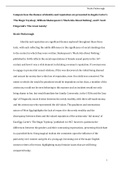Nicole Pinborough
Compare how the themes of identity and reputation are presented in Angela Carter’s
‘The Magic Toyshop’, William Shakespeare’s ‘Much Ado About Nothing’, and F. Scott
Fitzgerald’s ‘The Great Gatsby’
Nicole Pinborough
Identity and reputation are significant themes explored throughout these three
texts, with each reflecting the subtle difference in the significance of social standings due
to the context in which they were written. Shakespeare’s ‘Much Ado About Nothing,’
published in 1600, reflects the social expectations of female sexual purity in the 16th
century and how it was a vital element in dictating a woman’s reputation. If a woman was
to engage in premarital sexual relations, if this was discovered she risked being shamed
and outcast by society due to this loss of reputation, even if no child was conceived. The
extent to which she would be penalised would be dependent on her class; a member of the
aristocracy could not be seen behaving in this manner and an incident would not only
bring shame to her, but would humiliate her family. Conversely, in the 1920s and the ‘Jazz
Age’ of Fitzgerald, exists friction between the newly wealthy, with their self-made money,
and the aristocracy who represented the old values. The gaudiness and ostentatious
nature of West Egg highlights the lack of respect for the newly wealthy and the
discrepancy between them and the valued reputation of the aristocratic ‘old money’ of
East Egg. Carter’s ‘The Magic Toyshop,’ published in 1967, however, questions the
differences between the genders and their contrasting expectations, presenting this debate
in a parodied form. Using magical realism she comments upon the influence of the
patriarchy over women and girls of a young age, becoming one of the major English
women writers of her time, highlighting many feminist issues that are still being
conquered today.
1
, Nicole Pinborough
The way in which a character is established is of great importance, allowing the
reader to be introduced to themes and characterisation. Fitzgerald in particular employs
this technique to create a sense of mystery shrouding one of the principal characters, Jay
Gatsby. Despite being the eponymous character of the novel, Gatsby’s first lines do not
feature until halfway through the third chapter; before that he is only the subject of
speculation among other characters, and is glimpsed by Nick, who forms the peripheral
narrator, reaching out ‘towards the dark water.’ Fitzgerald, in delaying the entrance of
Gatsby, mirrors the confusion of the reader with the character’s shadowed past, which
causes rumour among those who attend his parties. Wild speculations of Gatsby’s past are
revealed to Nick, and in turn the reader, throughout the text, with characters believing ‘he
killed a man once,’ was a German spy, and an ‘Oxford man.’ As the novel progresses
Fitzgerald deconstructs the aura of fantasy he created around Gatsby, disclosing different
layers of the truth through Nick and gradually demythologising the ‘great’ concept of
Gatsby, finally revealing his criminal past.
In a similar fashion to Gatsby, Hero, the romantic heroine from ‘Much Ado About
Nothing’, is conscious of how she presents herself. Shakespeare could be seen as
characterising her as a meek, obedient woman, evident in the quantity of lines she is given
and how she is submissive to her father. Leonato, in Act Two Scene One, informs his
daughter of the Prince’s intention to marry her and also of her reaction; despite the
benevolent tone, the imperative, ‘you know your answer,’ highlights the extent to which
women had very little choice, not only of whom to marry, but in their everyday lives.
Whilst Hero does not object outwardly to her father’s decision, her silence could be
interpreted as defiance; it is possible that Hero rejects this order yet is unable to do so
within the constraints of society’s expectations for women and so remains silent to
maintain her desirable public appearance. Although Hero is presented as an embodiment
2





